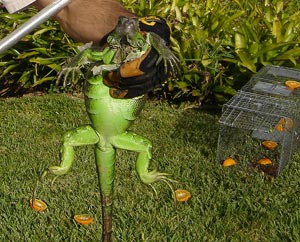|
|
|
Fort Lauderdale Iguana Control
| We are experts at South Florida Iguana removal. We understand that these exotic lizards have
no place in Florida, and are often a nuisance to homeowners. They breed in high numbers, and swarm all over the Fort Lauderdale area. They can
be seen in yards, in vegetation, basking on docks, and in canals, amongst other places. They eat vegetation such as
include hibiscus (flowers and leaves) including rosellia, nasturtium (flowers and leaves),
orchids, Impatiens, rose petals, violets (flowers and leaves), pansy flowers, and geranium petals. Many people simply don't want to deal with them
any more, so we remove them! |
|
 |
| We employ a variety of iguana catching techniques. Sometimes we hand capture, such as seen in
the above photo. This is an effective means of capture in situations with confined iguanas in unwanted areas. Sometimes we use a snare
pole, when we want to get iguanas that are difficult to reach and out of our grasp. Snaring is a good way to catch them. We also trap
and remove iguanas with cage traps, such as seen in the photo on the right. We use a variety of fruits and can catch several iguanas at once,
to make sure that we reduce the population on your property significantly. We can never eradicate them 100%, but we come close. |
|
 |

|
|